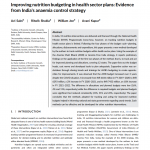
Potential Concerns with the Proposed Food Security Bill
24 June 2010
On Friday, relevant ministries in the Government of India and the National Advisory council are going to start a round of negotiations to finalize the much awaited food security bill. The key issue up for debate is the question of universalization of the entitlement. The initial draft bill restricted the entitlement to the country’s poorest. The current negotiations are an effort to push for universal coverage as well as for a wider grain basket. The second and perhaps more critical issue for debate is the steps that need to be considered to deal with the widespread corruption and leakage in the current Public Distribution system. The new draft bill prepared by the planning commission has proposed that the disbursement process be linked to the UID which could deal help with the elimination of bogus cards ( to give a sense of the scale of the problem- since 2006, 5,300,000 bogus ration cards had been identified in West Bengal. Andhra Pradesh wasn’t far behind at 1,046,000 and Orissa was amongst the lowest at 250,000!). Linking with the UID is one important way of dealing with the corruption menace. But, corruption and leakage in the PDS is not just about bogus cards. At every step of the delivery chain, the system is plagues with perverse incentives that make accountability and efficient delivery impossible. To give you a sense of the problem, the Accountability Initiatives’ Gayatri Sahgal analyses the different levels of corruption in the PDS system. If the new bill is to ensure that entitlements reach the poorest, problems at every level of the system need to be addressed. This requires the political will to address systemic failures and undertake radical administrative reforms. Let’s hope the new bill provides for that!
Diversion and Leakages in the PDS System
Key Facts
- There are significant leakages in the functioning of the PDS system. Only about 42% of subsidized grains issued from the Central Pool reach the target group. Over 36% of the budgetary subsidies on food is siphoned off the supply chain and another 21% reaches the APL households. (Performance Evaluation of Targeted Public Distribution System Planning commission, 2005).
- Data regarding the leakages in terms of type of food grain revealed 36% diversion of wheat, 31% diversion of rice and 23% diversion of sugar. Diversion appears to be more of a feature of northern, eastern and north Eastern states (Saxena, 2009).
- Share of food subsidy received by Below Poverty Line (BPL) families and Antyodaya Anna Yojana (AAY) scheme has been decreasing. In FY 2008-09, BPL and AAY received 84% of total food subsidy released, down from 80 % in FY 2006-07 (Accountability Initiative, 2010).
- Amongst the States, Bihar and Punjab have the highest rates of leakages; more than 75% of the grain allotted from the central pool fails to reach the intended beneficiaries. States such as AP, Kerala, Orissa, Tamil Nadu, and West Bengal, record leakages below 25% and are considered to be low leakage states (Planning Commission, 2005).
- At the level of the Fair Price Shops FPS, states such as Haryana, Bihar and Punjab record the highest levels of leakages (above 50%), while states such as HP, Assam, MP, Orissa, Tamil Nadu, and West Bengal record rates of leakages less than 10% (Planning Commission, 2005).
- The FPSs are generally not viable because of low annual turnover and they remain in business through leakages and diversions of subsidised grains (Planning Commission, 2005).
- Though the off-take per household has shown some improvement under TPDS, yet only about 57% of the BPL households are covered by the TPDS (Planning Commission, 2005).
- The cost of income transfer to the poor through PDS is much higher than that through other modes. According to the study, for one rupee worth of income transfer to the poor, the GoI spends Rs 3.65, indicating that one rupee of budgetary consumer subsidy is worth only 27 paise to the poor (Saxena, 2009).
- Leakages due to improper storage and transportation facilities are also significant. In FY 2008-09, Rs. 101 crore and Rs. 133 crore was lost due to poor storage and transportation respectively (Food Subsidy Budget Brief, Accountability Initiative, 2010).
- Leakages in the form of ghost cards are also widely prevalent. In West Bengal, 53 lakh fake ration cards were cancelled from July 2006 till December 2009 (Accountability Initiative, 2010).
Click to view the Leakages and Diversions in the Public Distribution System.





